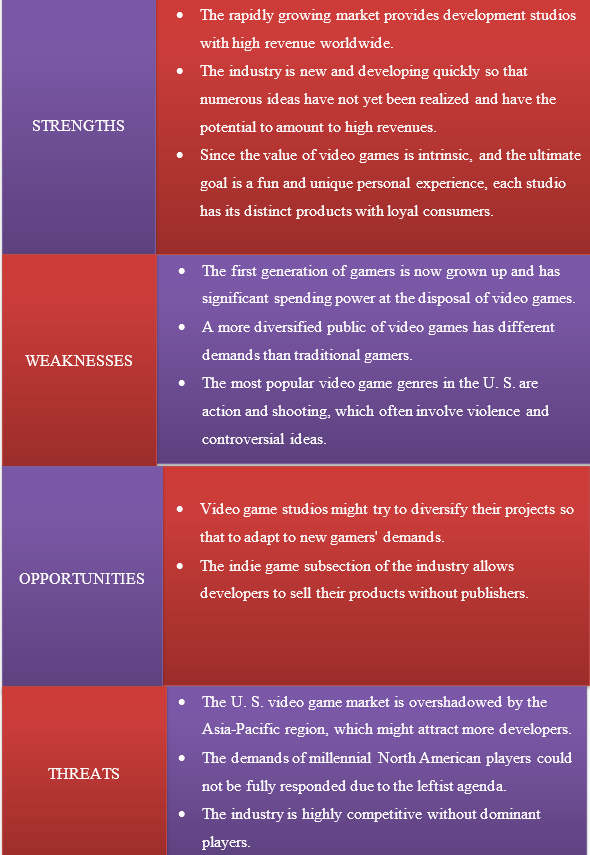Introduction
The current assignment aims at representing one of the grand challenges for the video game development industry. Precisely, cancel culture and the impact of its adherents’ actions are analysed throughout the work. According to Clement (2021) “a video game is an electronic game that can be played on a computing device” (para. 1). People engaged in the industry of video game development participate in various processes of manufacturing their products.
These include building specific gaming software, creating concepts and stories, designing audio-visual content of the games, supervising development projects, and interacting with publishment agencies (Starloop Studios, 2021). The industry’s products are present in most of the global stores. The most significant value share of the market and highest revenue come from Asia-Pacific, North America, and Europe; the developer studios are located in these regions accordingly (WePC, 2021). The focus of the work would be on the North American region’s video game industry and the challenges it encounters.
Analysis
However, various development studios faced problems coming from a rising phenomenon of nowadays Western society called “cancel culture.” According to the definition from Mishan (2020), the terms refer to “incidents both online and off that range from vigilante justice to hostile debate to stalking, intimidation and harassment” (para. 2). Predominantly, the adherents of the cancel culture are left-wings who try to reduce the opposing political agenda in various spheres of the information market (Norris, 2021).
In the video game industry, social justice warriors propagate the ideas of diversity and removal of products if their ideas are found controversial and somewhat disturbing for the liberal social populations, like in the United Sates. The leftist journalists and Twitter residents massively critique certain products to cancel the release of a game. For example, Six Days in Faluja, a video game about the battle between joint US and UK forces during the Iraqi war, was cancelled because of American-Muslim accusations of Islamophobia. Afterward, its developers from Atomic Studio lost their publisher and went bankrupt (Good, 2021). Thus, the cancel culture’s critiques hinder video games publishing and collapse definite studios’ work value.
SWOT Analysis

Weaknesses and Threats
From all the factors that influence the video game industry, the present weaknesses of development studios and their threats refer the most to the cancel culture great challenge. First of all, consumer gamers nowadays are young people who were growing up playing games, and now they have specific standards for products they buy (Clement, 2021). As a result, this circumstance creates difficulties for respectful, long-established studios.
These clients, predominantly millennial males, tend to view any political propaganda in games as unnecessary material, such as Gamergate adherents (Romano, 2021). Next, although the genre system supposes that each consumer can find the most appropriate game for them, people critique the products of genres they do not like. The differences between the demands often lead to unpleasant results for development studios. Games that could have significant revenue from traditional gamers could not be produced without the risk of cancellation.
5Ws and 1H
- Q1: WHAT is the problem? Cancel culture interferes with the video game development industry.
- Q2: WHY is it a problem? Video game studios depend on publishers who prefer to break contracts with companies whose products social justice warriors might regard controversial, yet such games are the most popular among loyal buyers of the developers.
- Q3: WHERE is the problem observed? The U. S., being the region where action and shooting games are the most popular, is simultaneously the state where cancel culture has power over developers.
- Q4: WHO does this affect? Video game studios lose their comparative advantages, while traditional gamers lose the ability to receive products that they need.
- Q5: WHEN was the problem first observed? The first sign of cancel culture emergence and influence on the gaming industry was in 2010 when Six Days in Fallujah was cancelled.
- Q6: HOW is the problem observed? Although the gaming industry is still growing, certain studios become bankrupt or cannot realize their projects because of massive adverse reactions of left-wing people in media.
Problem Statement
The video game industry is fast-growing and promising for entrepreneurs and creative people alike worldwide. In the U. S., action and shooting games are prevalent and bring the most significant revenue to the development studios. Yet, the studios suffer from the impact of cancel culture actors on their publishers. The differences between the demands of different consumers put into question the longevity and prosperity of the well-established video game studios.
Conclusion
To conclude, the overarching problem of the cancel culture impacting the various information spheres and industries connected to them influences the developers of video games. Namely, the studios that released games for the U. S. market, where action and shooting games are the most popular, now receive negative commentaries about their work. These reactions of social justice warriors or people who decided to take part in the cancellation result in problems with publishing products for the studios.
References
Chang, J. (2021). The video game industry stands as one of the fastest-growing industries in the world. With billions of active. Financesonline. Web.
Clement, J. (2021). Video game industry. Statista. Web.
Good, O. S. (2021). CAIR calls on Sony, Microsoft, Valve to ban Six Days in Fallujah. Polygon. Web.
IGDA. (n.d.). Core values & code of ethics. Web.
Mishan, L. (2020). The long and tortured history of cancel culture. The New York Times. Web.
Mordor Intelligence. (n.d.). Global gaming market. Web.
Norris, P. (2021). Cancel culture: Myth or reality? Political Studies. Published. Web.
Romano, A. (2021). What was Gamergate? The lessons we still haven’t learned. Vox. Web.
Starloop Studios. (2021). Game development stages: How video games are created?. Web.
Statista. (2021a). Video game preferences by genre in the U.S. 2021. Web.
Statista. (2021b). Video gaming market size worldwide 2020–2025. Web.
WePC. (2021). Video game industry statistics, trends and data in 2021. Web.

